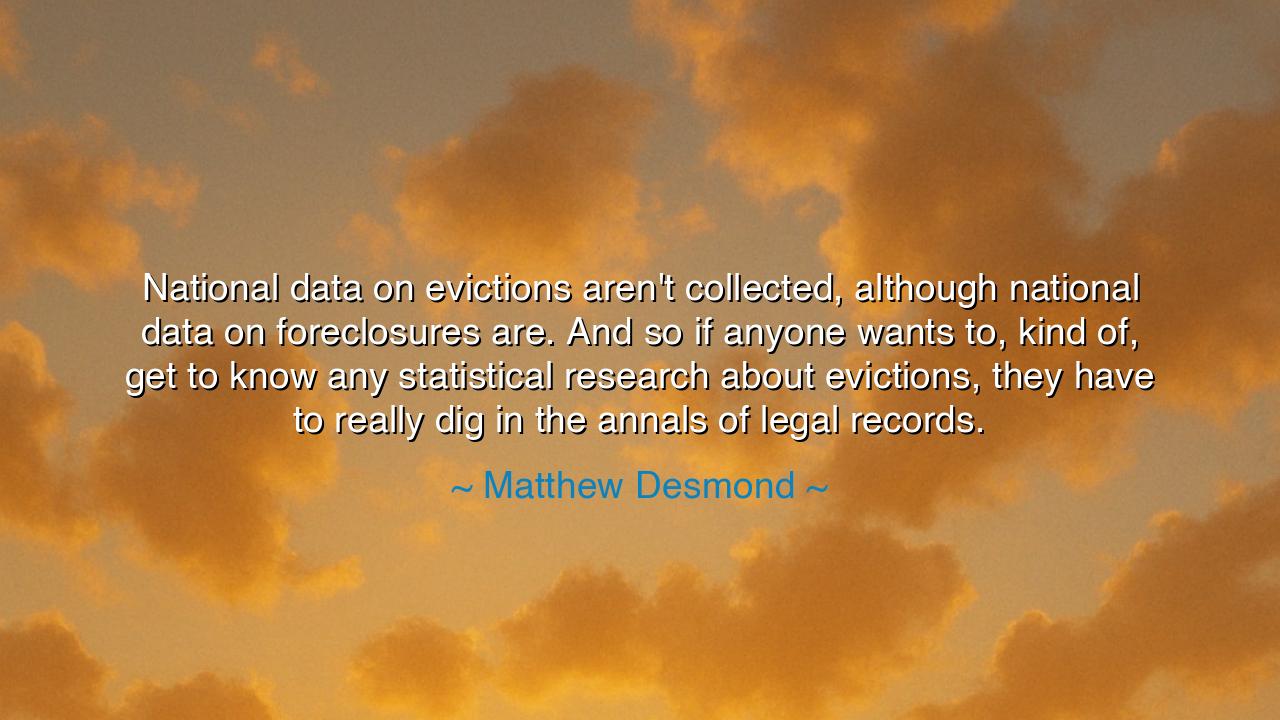
National data on evictions aren't collected, although national
National data on evictions aren't collected, although national data on foreclosures are. And so if anyone wants to, kind of, get to know any statistical research about evictions, they have to really dig in the annals of legal records.






The words of Matthew Desmond rise from the depths of social conscience like a quiet storm: “National data on evictions aren’t collected, although national data on foreclosures are. And so if anyone wants to, kind of, get to know any statistical research about evictions, they have to really dig in the annals of legal records.” At first glance, these are the words of a scholar — factual, measured, and precise. Yet beneath their surface lies a cry as ancient as civilization itself: the plea to see those who are invisible, to record the suffering that society prefers not to measure. For what Desmond reveals is not merely an absence of data, but an absence of empathy — the silence of systems that count property but not pain, mortgages but not memories, foreclosures but not families torn from their homes.
The origin of this quote emerges from Desmond’s lifelong mission to expose the hidden machinery of poverty in America. As a sociologist and author of Evicted, he delved into the forgotten neighborhoods where eviction is not an event but a cycle — a wound reopened each month by rising rents and stagnant wages. His observation about the lack of national eviction data is not a complaint about bureaucracy; it is a moral indictment. It reveals how a society that prides itself on its statistics, its numbers, and its records can still turn away from the most vulnerable. We measure the economy, but not the despair that underpins it; we count homes built, but not the ones lost in silence.
In the ancient world, it was said that the health of a city was not measured by its monuments or wealth, but by how it treated its poor. The philosopher Aristotle warned that injustice festers when the rich and the poor cease to know one another’s lives. Desmond’s words echo this wisdom across time: a nation that does not track evictions has chosen to look away from its own moral decay. To leave these numbers uncollected is to leave stories untold — the single mother who folds her child’s clothes in the back seat of a car, the elderly tenant whose final home is a shelter bed, the child who moves from school to school, learning that permanence is a luxury. These are not abstractions; they are the unseen citizens whose lives vanish between the lines of legal records.
Desmond himself has had to “dig in the annals of legal records” — dusty archives of county courts, files buried in bureaucratic obscurity. Each eviction case, in his hands, becomes a testament — a fragment of suffering rescued from erasure. This act of excavation is both scholarly and sacred. In it, Desmond plays the role of an ancient chronicler, pulling truth from decay. The same way archaeologists uncover lost civilizations by studying their ruins, Desmond uncovers the moral ruin of a modern nation by studying its legal documents. His research reveals a system where poverty is not accidental but engineered, where the law — once meant to protect — has become a mirror reflecting inequality back to the people it fails to serve.
This blindness to eviction, this refusal to gather its data, mirrors a broader truth about human nature: we are comfortable with suffering as long as it remains unseen. It is easy to empathize with a statistic about foreclosures, for it concerns property and banks — the language of the powerful. But to speak of evictions is to speak of people — of the faces of the poor, of human beings pushed to the margins. To record their suffering is to confront it, and that is something societies often fear. As in the ancient story of Lazarus and the rich man, the gulf between comfort and poverty becomes moral blindness — a blindness that can be measured not in what we see, but in what we refuse to measure.
Desmond’s quote is thus not only about research but about moral reckoning. He calls upon the scholars, the lawmakers, and the citizens of conscience to turn their gaze toward the forgotten. To collect data on eviction is not a matter of administrative diligence — it is an act of justice. For only when suffering is measured can it be addressed; only when it is recorded can it be remembered. The absence of data, in this light, becomes the most silent form of oppression — a method by which injustice hides behind the appearance of ignorance.
Let this be the lesson passed down to all generations: the measure of a people lies not in what they count, but in what they refuse to leave uncounted. A society that tallies profits but not the displaced, that tracks wealth but not the weary, has forgotten its humanity. Let every citizen, every scholar, every lawmaker, ask: Whose pain goes unrecorded in our time? And let them act. Dig into the annals of forgotten records. Restore names to the nameless. Give number to the invisible. For data is not merely information — it is remembrance, and remembrance is the first step toward redemption.
So heed the wisdom of Matthew Desmond: when the poor vanish from our charts, they vanish from our conscience. To collect their stories is not just the work of science — it is the work of the soul. And until we measure the suffering we ignore, we will never build the justice we claim to seek.






AAdministratorAdministrator
Welcome, honored guests. Please leave a comment, we will respond soon